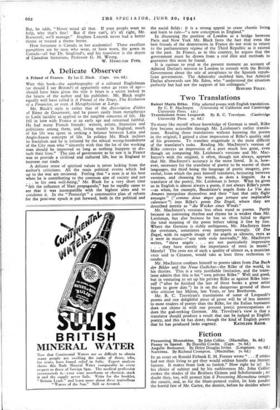Two Translations
Translations from Leopardi. By R. C. Trevelyan. (Cambridge University Press. 3s. 6d.)
To-many like myself whose knowledge of German is small, Rilke first became accessible through Mr. Leishman's earlier transla- tions. Reading those translations without knowing the poems in the original, I gained a clear impression of Rilke's quality and of his greatness. To translate magnitude is the most difficult of the translator's tasks. Reading Mr. Maclntyre's version of Rilke conveys an impression of a poet much less great, even though on comparing Mr. Leishman's versions and Mr. Mac- Intyre's with the original, it often, though not always, appears that Mr. Maclntyre's accuracy is the more literal. It is, how- ever, necessary for the translator of poetry to be master of three languages, the third being the language of poetic imagery, pre- verbal, from which the poet himself translates, hesitating between versions, and choosing his words, as does a linguist. As a translator of the poetry, Mr. Leishman is better. What hc,. gives us in English is almost always a poem, if not always Rilke's poem —as when, for example, Baudelaire's angels from Le Vin des Amants interpolate themselves and their " lust that only flight assuages " ("comme deux anges que torture une implacable calenture") into Rilke's poem Die Engel, where they are described merely as " die Wecker eines Winds."
Mr. Maclntyre's versions less often stand as poems. Partly because in conveying rhythm and rhyme he is weaker than Mr. Leishman, but also because he has so often failed to digest the total meaning of the poem before taking it line by line. Where the German is richly ambiguous, Mr. Maclntyre loses the overtones, sometimes even interprets wrongly. Of Die Engel, with its superb image of the angels as silences, rests as it were in music—" wie viele viele intervalle," Mr. Maclntyre writes, " these angels . . . are not particularly impressive . . . they have merely the importance of rests in music." Merely? The rests are of such a quality of silence as, a musician once said to Cezanne, would take at least three orchestras to render.
Mr. Maclntyre confines himself to poems taken from Das Buds der Bilder and the Neue Gedichte—the Rilke of the world, in his thirties. This is a very justifiable limitation, and the trans- lator admits that this is his " own private Rilke." Well and good, but in venturing to set up his private Rilke as against Rilke him- self (" after he finished the last of these books a great artist began to grow dim ") he is on the dangerous ground of those who criticise late Milton, late Yeats, or late Beethoven.
Mr. R. C. Trevelyan's translations of some of Leopardi's poems and one delightful piece of prose will be of less interest to most readers of poetry than the Rilke, for the Italian humanist does not chime in with our present poetic preoccupations as does the god-seeking German. Mr. Trevelyan's view is that a translator should produce a result that can be judged as English poetry, and this he has done; though the kind of English poetry
that he has produced lacks cogency. KATHLEEN RAIN!.


























 Previous page
Previous page